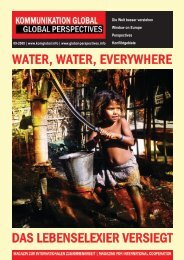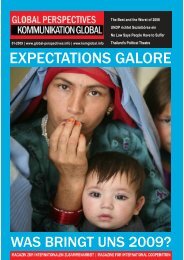GLOBAL PERSPECTIVES | Second Quarterly 2013 â North America ...
GLOBAL PERSPECTIVES | Second Quarterly 2013 â North America ...
GLOBAL PERSPECTIVES | Second Quarterly 2013 â North America ...
Create successful ePaper yourself
Turn your PDF publications into a flip-book with our unique Google optimized e-Paper software.
<strong>GLOBAL</strong> <strong>PERSPECTIVES</strong> - SECOND QUARTERLY <strong>2013</strong><br />
He noted that together with Brazil,<br />
China, India and Indonesia, “South<br />
Africa is one of our Key Partners”. This<br />
partnership, he added, is a two-way<br />
engagement: “one that allows us to<br />
support South Africa’s policy agenda for<br />
inclusive and sustainable growth; one<br />
that allows our members and other<br />
partner countries to benefit from your<br />
insights, expertise and unique<br />
experience.”<br />
However, the country is growing at a<br />
slower pace than other leading<br />
emerging economies, according to the<br />
Survey. “A high proportion of the<br />
population is out of work; offering<br />
people a brighter future by creating jobs<br />
is a policy priority,” Gurría said.<br />
“Income inequality remains high,<br />
educational outcomes should be<br />
improved and access to education needs<br />
to be inclusive. Environmental<br />
challenges like climate change and<br />
water scarcity need to be tackled to<br />
make economic growth green and<br />
sustainable. There is unfinished<br />
business that will require additional<br />
reform efforts.”<br />
Priority areas<br />
OECD identifies several priority areas<br />
for action. It asks South Africa to make<br />
better use of macroeconomic policy to<br />
support growth. It argues that the<br />
(budgetary) deficit expanded rapidly<br />
during the crisis and has been brought<br />
down only gradually since.<br />
Much of the increase in spending came<br />
through large increases in the public<br />
sector wage bill, while public<br />
investment has fallen as a share of total<br />
expenditure. With core inflation<br />
remaining well contained, monetary<br />
policy has been eased cautiously. The<br />
rand has fluctuated with inter-national sentiment, and has<br />
been overvalued for extended periods. The survey also<br />
urges the South<br />
The survey also urges the South African government to<br />
implement reforms to boost competition and improve the<br />
functioning of labour markets. Presently, most industries<br />
are highly concentrated, with network industries<br />
dominated by state‐ owned enterprises. Large firms are<br />
able to share excess returns with their employees via<br />
collective bargaining, and in some sectors the collective<br />
agreements are extended to other firms, creating a barrier<br />
to entry for small enterprises.<br />
This, says the survey, results in “a sharply dualised labour<br />
market”, with a well-paid formal sector covered by<br />
collective bargaining and a secondary market where pay is<br />
low and conditions poor. Subsequently, many South<br />
Africans are excluded from work altogether, contributing<br />
to poverty, inequality, and ill health. Strengthening product<br />
market competition and improving the functioning of<br />
labour market institutions should therefore be high<br />
priorities, says the survey. [IDN | March 5, <strong>2013</strong>] <br />
Photo above: South African Finance Minister Pravin Gordhan<br />
- 21 -















